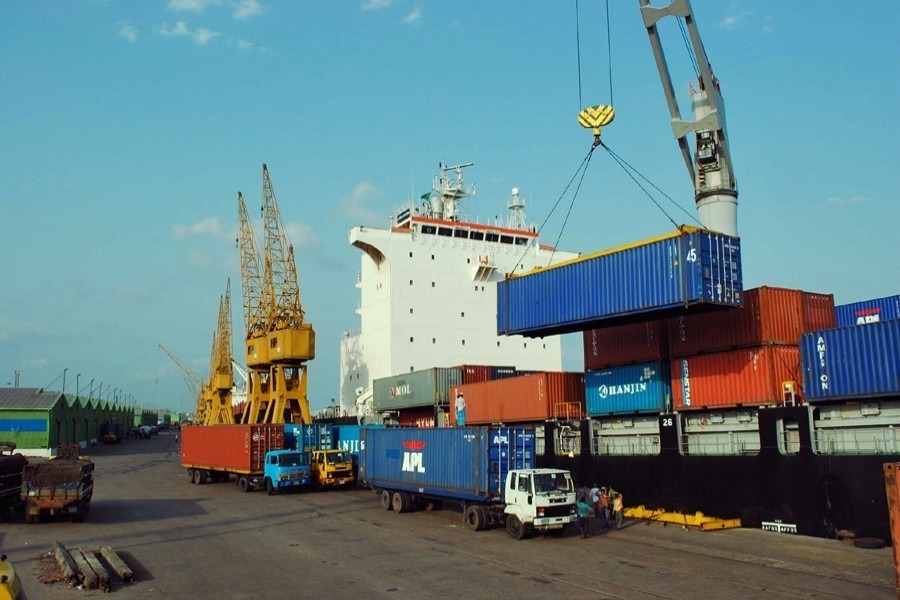Chittagong seaport finally enforces hiked tariffs from midnight Oct 14
Stakeholder concern stokes about trade cost spikes

Published :
Updated :

Ramped-up tariffs across 23 services categories at Chittagong seaport are set to be enforced from midnight October 14, following the end of a one-month suspension conceded amid strong port-user opposition.
The enforcement date is confirmed in Chittagong Port Authority (CPA) notification issued on Tuesday night. The firman is undersigned by CPA Chief Finance & Accounts Officer Mohammad Abdus Shakur.
According to the circular, all vessels, containers, and cargos arriving at the port after 12:00 midnight on October 14 will be subject to the new rates.
The revised tariffs -- CPA's first major hike in nearly four decades -- were originally slated for enforcement on September 15.
However, businesses and trade bodies pushed back, citing fears of rising costs for exporters, importers, and consumers. This led the Shipping Ministry to temporarily defer the decision.
Earlier, the Shipping Adviser had announced a one-month moratorium during a stakeholder workshop on September 20.
Leaders of BKMEA and BSSA have confirmed that they will write to the government with their request for a review of and reduction in the new tariff rates.
Under the revised structure, container-handling charges will see the sharpest increases ever. The fee for handling a 20-foot container will rise by Tk 4,395 -- from Tk 11,849 to Tk 16,244 -- in a 37-percent raise. Charges on import containers will increase by Tk 5,720, while export containers will cost Tk 3,045 more.
Loading-unloading fees per container are expected to rise by about Tk 3,000. Meanwhile, container-cargo-handling fees per kilogram will increase from Tk 1.28 to Tk 1.75-a jump of nearly 37 per cent.
Waiting charges for vessels have also been revised significantly up. Ships delayed beyond their scheduled berthing time will face double charges after 12 hours, 300 per cent after 24 hours, 400 per cent after 36 hours, and up to 900 per cent beyond that period.In addition, piloting fees have been fixed at $800 per vessel, while tugging charges will rise to $6,830 each time a vessel is towed.
Shipping agents have been directed to ensure adequate funds in their bank accounts to obtain no-objection certificates (NOCs) for vessel clearance, while software vendors have been instructed to update the port's billing systems to reflect the new tariff structure.
Mohammad Hatem, President of Bangladesh Knitwear Manufacturers and Exporters Association (BKMEA), says the decision would hurt trade at a critical time.
"As a state entity, the port is meant to facilitate trade -- not operate as a profit-making organisation," Hatem told The Financial Express. "Yet, we are seeing tariff hikes without any improvement in service quality."
He argues that tariff adjustments should be gradual -- ideally not exceeding 10 per cent annually -- and must involve stakeholder consultations.
"This abrupt increase will raise manufacturing costs and reduce export competitiveness, especially as Bangladesh prepares to graduate from LDC status and lose existing trade benefits," he says.
Hatem also points to operational inefficiencies at the port, such as delays in cargo release, which already impose extra costs on businesses.
"Entrepreneurs are being asked to absorb new, unexpected expenses. The one-month extension offers little relief," the export-industry leader rues.
Echoing Hatem's remarks, Syed M Arif, Chairman of the Bangladesh Shipping Agents Association (BSSA), warns that higher tariffs from the port, berth operators, and off-dock service providers will increase the overall cost of trade and logistics.
"Foreign shipping lines may have no option but to raise freight charges, which will further strain Bangladesh's foreign trade," Arif told The Financial Express.
He criticizes the short notice for implementing the revised tariffs, calling it "a humiliating move for trade bodies". It shows a lack of proper evaluation or stakeholder engagement.
Arif says he had raised the issue with the Shipping Adviser last month, who assured them of a 10-percent reduction in the proposed rates. "But we have seen no evidence of that."
He stresses that international shipping contracts are long-term, often finalised months in advance, and that foreign principals require at least six months to adjust to changes.
"A ship takes about 1.5 months to reach its destination, and contracts are signed 2-2.5 months earlier. This rushed implementation will disrupt operations and create confusion," he says.
Chattogram Port handles 92 per cent of Bangladesh's seaborne import-export trade and 98 per cent of its containerised cargos. In 2024, it handled 3,275,627 TEUs (twenty-foot equivalent units), up from 3,050,793 in 2023 and 3,142,504 in 2022. The port deals with around 130 million metric tonnes of cargos and over 4,000 vessels annually.
newsmanjasi@gmail.com


 For all latest news, follow The Financial Express Google News channel.
For all latest news, follow The Financial Express Google News channel.